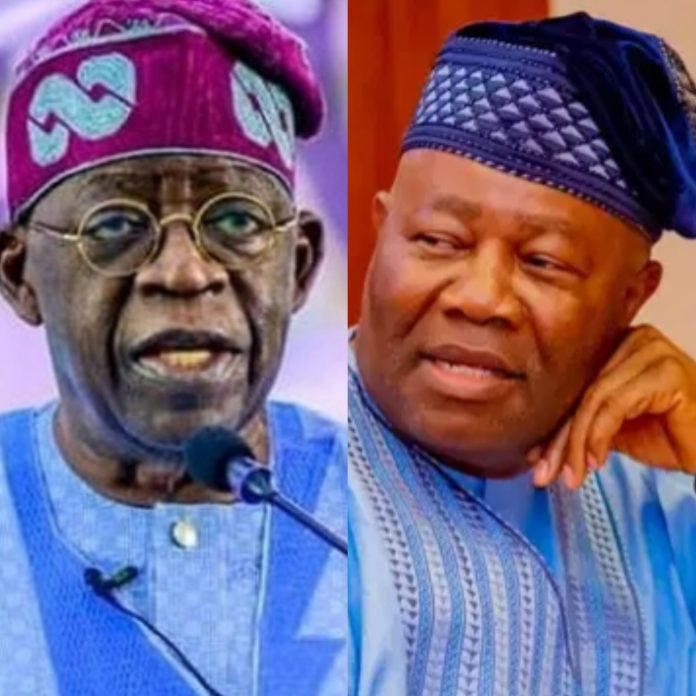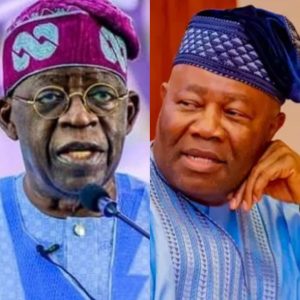A combined picture of President Bola Tinubu and Senate President Godswill Akpabio
In the sweltering heat of Abuja, where the Aso Rock Villa casts a long shadow over Nigeria’s capital, an unusual alliance is reshaping the nation’s future. President Bola Ahmed Tinubu, a veteran strategist with relentless drive, stands at the helm of Africa’s most populous democracy. Across the city, in the red-carpeted chambers of the National Assembly, Senate President Godswill Akpabio, his voice a booming clarion, commands the Senate with theatrical flair. Together, they are weaving a story of unity, a tale of a presidency and legislature uniting to mend a nation frayed by hardship and division.
But this is no simple harmony. It is a high-stakes waltz, one that could either herald a new dawn for Nigeria’s estimated 200 million people or slip into a cautionary tale of unchecked power. This is the story of Akpabio’s Senate and Tinubu’s Presidency, not a rubber stamp legislature as critics quip on the digital streets of X, but a pragmatic partnership to serve one country, one people.
Yet, as history warns and the people’s struggles cry out, when the dance between these two arms of government falters, it is the citizens who bear the cost.
■ Lessons from a turbulent past
Nigeria’s democratic journey reads like a turbulent novel, punctuated by military coups, fleeting civilian rule, and a constant tug-of-war between ambition and accountability. In 1983, President Shehu Shagari’s administration grappled with a combative National Assembly led by Dr. Joseph Wayas, exacerbating an economic crisis that saw oil prices plummet and inflation soar.
The legislature’s resistance to Shagari’s fiscal policies stalled critical reforms, deepening public hardship and paving the way for a military coup that ended the Second Republic. This bitter lesson lingers, a reminder of the chaos that ensues when the executive and legislature fail to find common ground.
This legacy of discord carried into Nigeria’s Fourth Republic. From Tinubu’s clashes with President Olusegun Obasanjo over local government funds in the early 2000s to the Eighth National Assembly’s battles with President Muhammadu Buhari from 2015 to 2019, delaying budgets and eroding public trust. The fallout was stark: roads crumbled, hospitals languished, and only 26% of voters turned out in the 2023 election, a silent rebuke of governance more performative than productive.
Enter Tinubu and Akpabio, bound by their roots in the All Progressives Congress and a shared vision of a new Nigeria. Tinubu, a political kingmaker who transformed Lagos into an economic hub, orchestrated Akpabio’s rise to the Senate presidency in June 2023. Akpabio, a former governor known for his charisma and deal-making, has vowed that the Tenth National Assembly is no pawn. “We are not a rubber stamp,” he declared, his words echoing through the Senate chambers. “We scrutinise, we amend, we legislate for the people.”
■ A symphony of synergy
The proof of this pact lies in its deeds. In December 2024, the Senate swiftly passed Tinubu’s Budget of Restoration, a blueprint titled Securing Peace, Rebuilding Prosperity. With ₦826.9 billion earmarked for education and ₦402 billion for health, it reflects a shared commitment to Nigeria’s youth and ailing.
When Tinubu pushed contentious tax reforms to boost revenue, Akpabio’s Senate, despite grumbles from northern governors, delivered, earning praise from the IMF and credit rating agencies, as reported by Reuters. Ministerial nominees like Jumoke Oduwole, a trade expert, and Bianca Ojukwu, a diplomat, sailed through confirmations, a far cry from the gridlock of the Saraki-Buhari era.
To be fair, the impact has been tangible so far. The Nigeria Education Loan Fund, backed by both leaders, has disbursed ₦34 billion to more than 300,000 students across Nigeria, as reported by BusinessDay. This initiative has brought hope to students like Aisha, a first-generation university scholar in Sokoto. “This loan means I can study without begging,” she says, clutching her acceptance letter with relief.
On X, voices like @NaijaPatriot hail the partnership as “a government that works,” while Akpabio’s call to “transcend doubt” and embrace Tinubu’s Renewed Hope Agenda resonates in churches and mosques. This synergy is no small feat in a nation fractured by ethnic and religious fault lines. Tinubu, a Yoruba from the Southwest, and Akpabio, an Annang from the Niger Delta, embody a cross-regional alliance that projects unity. Their collaboration has smoothed the path for reforms like petrol subsidy removal and currency liberalisation, policies that have stabilised Nigeria’s foreign exchange reserves, according to The Africa Report. For the market women of Oshodi and the farmers of Benue, this offers a flicker of hope that governance might finally deliver.
■ Lessons from distant shores
Nigeria is not alone in this delicate dance. The United States, with its presidential system, offers a mirror. In the 1990s, President Bill Clinton worked with a Republican Congress to pass welfare reform and balance budgets, proving collaboration can yield results. Yet, the United States also warns of pitfalls: after the September 11 2001 attacks, a pliant Congress under George W. Bush faced criticism for failing to check executive overreach, a lesson Nigeria must heed, as Chatham House notes.
In India, Prime Minister Narendra Modi’s iron grip on a supportive parliament pushed through the Goods and Services Tax, but critics warn it silenced dissenting voices in New Delhi’s vibrant democracy. South Africa’s African National Congress, under President Cyril Ramaphosa’s steady hand, has streamlined policies like land reform but faced accusations of weakened oversight. These democracies whisper a truth: synergy accelerates progress, but a legislature that merely nods risks betraying its role as the people’s watchdog.
■ The shadow of discord
When the executive and legislature clash, the consequences are stark. Shagari’s struggles in 1983 left Nigeria vulnerable to economic collapse and military intervention. In 2011, President Goodluck Jonathan’s bid to install Mulikat Adeola as House Speaker was thwarted by Aminu Tambuwal’s rebellion, leading to legislative gridlock. Budgets languished and infrastructure stalled.
The Tinubu-Akpabio harmony has averted such paralysis, but shadows loom. On X, lawyer @InibeheEffiong warns that the Senate’s swift approvals smack of subservience. “Where is the oversight?” he tweeted, echoing civil society’s concerns. The economic hardship from Tinubu’s reforms has fuelled discontent.
■ Walking the tightrope
This partnership treads a tightrope. Tinubu’s role in Akpabio’s election, as noted by Blueprint newspaper, raises fears of a legislature beholden to the executive. Yet, Akpabio insists the Senate has teeth, pointing to its rejection of some nominees and probes into agencies like the humanitarian funds scandal. To counter perceptions of being “a care home for docile politicians,” as @MezieAbia quipped, the Senate must amplify oversight through public hearings and independent audits.
Nigeria’s 1999 Constitution, with its separation of powers, demands this balance. Section 4 grants the National Assembly lawmaking authority, while Section 5 empowers the president to execute laws. When done right, as in Germany’s consensus-driven Bundestag under Chancellor Olaf Scholz, this interplay fosters stability without sacrificing scrutiny. Nigeria cannot afford the alternative: America’s 2013 government shutdown, driven by executive-legislative strife, cost $24 billion. With inflation at 33% and insecurity rife, brinkmanship is a luxury Nigeria cannot indulge.
■ A nation at a crossroads
As the sun sets over Abuja, Tinubu and Akpabio stand at a crossroads. Their pact has lit a spark: budgets passed, reforms enacted, students empowered. The 2025 budget’s focus on education and health, alongside the loan fund’s lifeline, signals a commitment to human capital. Yet, the grumbles and warnings from critics linger. “One country, one people,” Akpabio declared, his voice a call for unity. Tinubu, ever the strategist, promises a new day for Nigeria.
The stakes are monumental. As Africa’s largest democracy, Nigeria is a beacon for a continent grappling with similar challenges. If Tinubu and Akpabio deliver prosperity without sacrificing accountability, they could set a model for others, as South Africa’s ANC has done despite its flaws. But if their alliance becomes a blank cheque, the dreams of millions risk being squandered.
For Aisha and millions more, the question is whether this waltz will lift them up or leave them behind. The Senate must resist the caricature of a rubber stamp, not by opposing Tinubu reflexively, but by asserting its relevance constructively, asking tough questions, demanding data, and saying no when needed. Tinubu, on the other hand, must welcome scrutiny as a tool of refinement, not rebellion.
In a nation yearning for progress and unity, the story of Tinubu and Akpabio’s delicate dance is still being written. Will it be a tale of triumph? Or will it become a tragedy? The answer hinges on their courage to balance loyalty with accountability, power with principle, and only time will tell if their waltz will be celebrated or excoriated.
■ Mr Momodu is an Abuja-based political affairs analyst.


